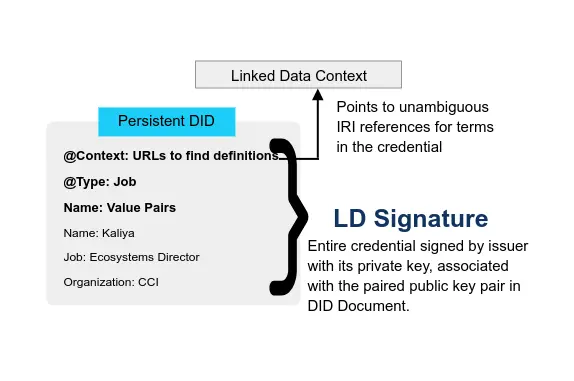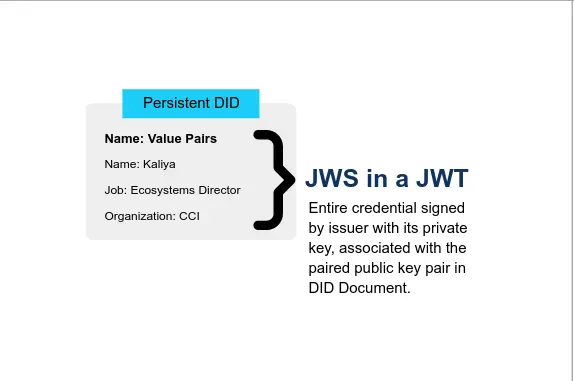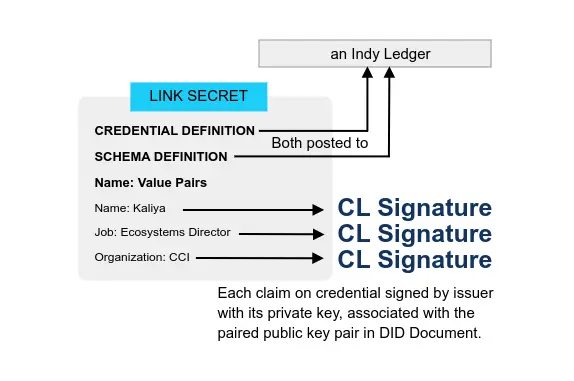Sidetree Working Group - DIF
Main
- Sidetree Working Group
The development and maintenance of the formal Sidetree specification, and a hub of coordination for Sidetree-based DID Method node operators. This group also generates libraries, tooling, and documentation to aid Sidetree-based DID Method node operators.
About
- Decoding the Sidetree Protocol 2021-05-25 Affinidi
Sidetree protocols are layer 2 protocols that anchor to the underlying decentralized ledger system. That said, it is ledger agnostic and its primary role is to anchor batches of signed JSON operations to the network.
- Sidetree Protocol reaches V1 2021-04-12 DIF
This week, the DIF Steering Committee officially approved the first major release of the Sidetree Protocol specification, “v1” so to speak. This protocol has already been implemented, and four of its implementers have been collaborating intensively for over a year on expanding and extending this specification together.
- Sidetree Protocol / Element DID and Friends 2020-04-30 IIW30
- Sidetree did:ion + did:elem Roadmap + dev IIW29
We discussed that it allows the did controller to update their did document, including adding support for experimental features or new key types like GPG and BBS.
Troy from Secure Key explained how they use Sidetree with Hyper Ledger Fabric.
Secure Key uses sidetree for things other than did documents.
Transmute uses Sidetree to store hashlinks to Encrypted Data Vaults / Secure Data Stores as a way of scalably commiting to specific versions of credentials.
- Sidetree protocol – Massivly Scalable Decentralized Identifiers – DEEP DIVE IIW28
- Sidetree on Ethereum “Element 2019-10-08 IIW28

Specs & Projects
Sidetree
- Sidetree Protocol
Spec, docs, and implementations for the chain/ledger-agnostic DID scaling protocol.
- decentralized-identity/sidetree
Sidetree Specification and Reference Implementation
- sidetree-ipfs-datastores
Implementations of IPFS datastore used by sidetree-ipfs microservice
ION
- Install Guide
An implementation of the Sidetree protocol atop the Bitcoin blockchain.
- decentralized-identity/ion
ION is a public, permissionless, Decentralized Identifier (DID) network that implements the blockchain-agnostic Sidetree protocol on top of Bitcoin (as a ‘Layer 2’ overlay) to support DIDs/DPKI (Decentralized Public Key Infrastructure) at scale.
- ion-integration-test
An integration test script that helps verify that the sidetree microservices are working properly.
- ion-sdk
TypeScript SDK for ION
- ion-tools
Tools and utilities to make working with the ION network and using ION DIDs easy peasy lemon squeezy
Introduction to Ion – a layer 2 network for Decentralized Identifiers with Bitcoin - Daniel Buchner 2019-06-13 SSI Meetup
Microsoft presented in May 2019 in New York the first decentralized infrastructure implementation by a major tech company that is built directly on the Bitcoin blockchain called Ion. Daniel Buchner, who is leading this initiative at Microsoft and a founding member of the Decentralized Identity Foundation, will discuss the culture at Microsoft, how decentralized identity works with Bitcoin and what you need to know to use the Bitcoin blockchain for non-financial transactions.
Ion handles the decentralized identifiers, which control the ability to prove you own the keys to this data.
Element
- Element - An implementation of the Sidetree protocol using the Ethereum blockchain. GitHub
- The Element DID Method: Sidetree, Ethereum & IPFS – Orie Steele 2019-11-10 SSI-Meetup
Orie Steele is Cofounder and CTO of Transmute, a company developing IAM and Verifiable Credential solutions that integrate Decentralized Identity for Enterprises. He has a BS in Cyber Security and MS in Computer Science from Stevens Institute of Technology where he studied social network malware and botnets between 2007-2012. He was an early engineer at Patient IO, a Techstars backed startup acquired by Athena Health in 2016, where he helped develop and secure a care coordination platform that connected nurses and patients.
In this talk, Orie will discuss the history of the Element DID Method, how it leverages the same Sidetree Protocol that is used by ION on the Bitcoin Network. He’ll introduce the motivation for Element and ION, and then walk through the core components of developing a working DID System, including topics such as wallets, signing, DID resolution, key revocation, and decentralization.




